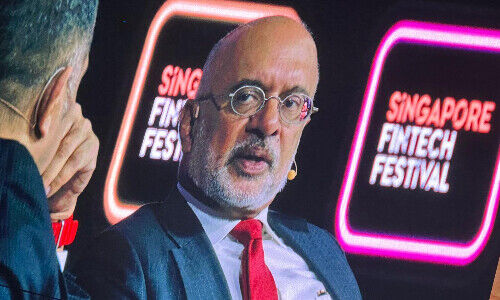Jan Beckers: «The Biggest Investment Opportunity of the Next Decade»
Hardly any other topic has unleashed a comparable wave of enthusiasm, skepticism and speculation this year as the developments surrounding generative artificial intelligence. Even experts find it difficult to grasp the implications of this technology for companies and investors holistically, Jan Beckers writes in an article on finews.first.
This article is published on finews.first, a forum for authors specializing in economic and financial topics.
Hardly any other topic has unleashed a comparable wave of enthusiasm, skepticism and speculation this year as the developments surrounding generative artificial intelligence (GenAI). New innovations and applications hit the headlines almost every day. The functions of newly developed AI tools seem to challenge processes in almost every industry. Even experts find it difficult to grasp the implications of this technology for companies and investors holistically.
GenAI is one of the most important key technologies and the most significant investment opportunity of the coming decade. However, it took the so-called «iPhone moment» to convince the wider public of the technology's impressive capabilities and to achieve a commercial breakthrough.
«The quality of the models has now reached a marketable level»
This is exactly what OpenAI has achieved with its AI model «ChatGPT» – a Large Language Model (LLM) with which users can query information in a simulated conversation. The enthusiasm for the technology can be seen in the number of users: In terms of growth, ChatGPT has far surpassed even online platforms such as Instagram or TikTok. The quality of the models has now reached a marketable level. The availability of open-source models and an improved infrastructure make adaptation for variable applications easier than ever. It is clear that the technology not only has the potential to decisively influence existing business models by increasing efficiency and profit margins. It can also enable completely new business models.
There are still few «pure AI players» on the stock market. Nevertheless, investors already have the opportunity to structure their portfolios along this key technology. This is because numerous companies and industries are likely to benefit from progress – from hardware suppliers to tool providers to companies that can automate many steps of their value creation through GenAI and thus exploit the massive cost-saving potential. The implications for the stock market and especially technology stocks will probably be so far-reaching and immense that they cannot yet be fully surveyed, let alone predicted.
«The company is the leading supplier of GPU chips and thus provides the essential infrastructure for GenAI»
However, very concrete effects on the market have already emerged: the performance of the chip manufacturer Nvidia, now the sixth largest company in the world, impressively demonstrated in May 2023 how immensely important AI already is on the capital markets. After the publication of the figures for the first quarter of 2023, the market capitalization was catapulted by 30 percent and close to the trillion-dollar mark. The reason for this was the increase in the revenue forecast for the second quarter of 2023 by more than 50 percent.
This significant development is mainly due to the company's strong positioning in the field of GenAI. The company is the leading supplier of GPU chips and thus provides the computing power, i.e. the essential infrastructure for GenAI. Overall, it is the pioneers of generative AI that significantly shape entire indices such as the S&P 500. An equally weighted selection of the seven companies Apple, Microsoft, Alphabet, Amazon, Nvidia, Meta and Tesla from the S&P 500 was responsible for 80% of the stock index's earnings from the beginning of the year until the beginning of June 2023.
«Asset managers can also use GenAI for their own purposes»
Investors benefit from early positioning and stock selection of GenAI: In this context, it is crucial to identify the future top performers from a large number of companies and supposed AI profiteers at the right time and, above all, at the right price. The precondition for this is to understand the structural characteristics of the technology and the resulting effects on growth, competitive advantages, prices and margins. For AI companies, for example, low-cost access to data, specialized computing power and software talent plays a major role in their potential, as does the resulting margin profile.
In addition to the positive effects of GenAI on the companies in the technology universe, asset managers can also use GenAI for their own purposes. For example, they can also actively apply the technology in their own investment approaches and processes. It is true that the use of fully automated AI portfolio managers is rather unlikely in the short and medium term. However, GenAI can provide support in various aspects of the investment process – from the generation of ideas to in-depth analysis and continuous monitoring. In this way, the analysis of unstructured data – for example from financial reports – can be accelerated considerably.
Jan Beckers is the founder and Chief Investment Officer (CIO) of the asset manager BIT Capital. In these two functions, he is responsible for the company's investment approach. He brings many years of experience in the technology sector and was named «Entrepreneur of the Year in Germany» by EY in 2014. His vision is to give investors access to profitable investment products and to actively support Europe's prosperity development and future viability.
Previous contributions: Rudi Bogni, Peter Kurer, Rolf Banz, Dieter Ruloff, Werner Vogt, Walter Wittmann, Alfred Mettler, Robert Holzach, Craig Murray, David Zollinger, Arthur Bolliger, Beat Kappeler, Chris Rowe, Stefan Gerlach, Marc Lussy, Nuno Fernandes, Richard Egger, Maurice Pedergnana, Marco Bargel, Steve Hanke, Urs Schoettli, Ursula Finsterwald, Stefan Kreuzkamp, Oliver Bussmann, Michael Benz, Albert Steck, Martin Dahinden, Thomas Fedier, Alfred Mettler, Brigitte Strebel, Mirjam Staub-Bisang, Nicolas Roth, Thorsten Polleit, Kim Iskyan, Stephen Dover, Denise Kenyon-Rouvinez, Christian Dreyer, Kinan Khadam-Al-Jame, Robert Hemmi, Anton Affentranger, Yves Mirabaud, Katharina Bart, Frédéric Papp, Hans-Martin Kraus, Gerard Guerdat, Mario Bassi, Stephen Thariyan, Dan Steinbock, Rino Borini, Bert Flossbach, Michael Hasenstab, Guido Schilling, Werner E. Rutsch, Dorte Bech Vizard, Adriano B. Lucatelli, Katharina Bart, Maya Bhandari, Jean Tirole, Hans Jakob Roth, Marco Martinelli, Thomas Sutter, Tom King, Werner Peyer, Thomas Kupfer, Peter Kurer, Arturo Bris, Frederic Papp, James Syme, Dennis Larsen, Bernd Kramer, Armin Jans, Nicolas Roth, Hans Ulrich Jost, Patrick Hunger, Fabrizio Quirighetti, Claire Shaw, Peter Fanconi, Alex Wolf, Dan Steinbock, Patrick Scheurle, Sandro Occhilupo, Will Ballard, Nicholas Yeo, Claude-Alain Margelisch, Jean-François Hirschel, Jens Pongratz, Samuel Gerber, Philipp Weckherlin, Anne Richards, Antoni Trenchev, Benoit Barbereau, Pascal R. Bersier, Shaul Lifshitz, Klaus Breiner, Ana Botín, Martin Gilbert, Jesper Koll, Ingo Rauser, Carlo Capaul, Markus Winkler, Thomas Steinemann, Christina Boeck, Guillaume Compeyron, Miro Zivkovic, Alexander F. Wagner, Eric Heymann, Christoph Sax, Felix Brem, Jochen Moebert, Jacques-Aurélien Marcireau, Ursula Finsterwald, Michel Longhini, Stefan Blum, Zsolt Kohalmi, Karin M. Klossek, Nicolas Ramelet, Søren Bjønness, Gilles Prince, Salman Ahmed, Peter van der Welle, Ken Orchard, Christian Gast, Jeffrey Bohn, Juergen Braunstein, Jeff Voegeli, Fiona Frick, Stefan Schneider, Matthias Hunn, Andreas Vetsch, Fabiana Fedeli, Kim Fournais, Carole Millet, Swetha Ramachandran, Thomas Stucki, Neil Shearing, Tom Naratil, Oliver Berger, Robert Sharps, Tobias Mueller, Florian Wicki, Jean Keller, Niels Lan Doky, Karin M. Klossek, Johnny El Hachem, Judith Basad, Katharina Bart, Thorsten Polleit, Peter Schmid, Karam Hinduja, Zsolt Kohalmi, Raphaël Surber, Santosh Brivio, Mark Urquhart, Olivier Kessler, Bruno Capone, Peter Hody, Michael Bornhaeusser, Agnieszka Walorska, Thomas Mueller, Ebrahim Attarzadeh, Marcel Hostettler, Hui Zhang, Michael Bornhaeusser, Reto Jauch, Angela Agostini, Guy de Blonay, Tatjana Greil Castro, Jean-Baptiste Berthon, Marc Saint John Webb, Dietrich Goenemeyer, Mobeen Tahir, Didier Saint-Georges, Serge Tabachnik, Vega Ibanez, David Folkerts-Landau, Andreas Ita, Michael Welti, Mihkel Vitsur, Fabrizio Pagani, Roman Balzan, Todd Saligman, Christian Kaelin, Stuart Dunbar, Carina Schaurte, Birte Orth-Freese, Gun Woo, Lamara von Albertini, Ramon Vogt, Andrea Hoffmann, Niccolò Garzelli, Darren Williams, Benjamin Böhner, Mike Judith, Jared Cook, Henk Grootveld, Roman Gaus, Nicolas Faller, Anna Stünzi, Thomas Höhne-Sparborth, Fabrizio Pagani, Guy de Blonay, Jan Boudewijns, Sean Hagerty, Alina Donets, Sébastien Galy, Roman von Ah, Fernando Fernández, Georg von Wyss, Stefan Bannwart, Andreas Britt, Frédéric Leroux, Nick Platjouw, Rolando Grandi, Philipp Kaupke, Gérard Piasko, Brad Slingerlend, Dieter Wermuth, Grégoire Bordier, Thomas Signer, Brigitte Kaps, Gianluca Gerosa, Christine Houston, Manuel Romera Robles, Fabian Käslin, Claudia Kraaz, Marco Huwiler, Lukas Zihlmann, Nadège Lesueur-Pène, Sherif Mamdouh, Harald Preissler, Taimur Hyat, Philipp Cottier, Andreas Herrmann, Camille Vial, Marcus Hüttinger, Ralph Ebert, Serge Beck, Alannah Beer, Stéphane Monier, Ashley Simmons, Lars Jaeger, Claude Baumann, Shanna Strauss-Frank, Bertrand Binggeli, Marionna Wegenstein, George Muzinich, Jian Shi Cortesi, Razan Nasser, Nicolas Forest, Joerg Ruetschi, Reto Jauch, Bernardo Brunschwiler, Charles-Henry Monchau, Philip Adler, Brigitte Kaps, Ha Duong, Teodoro Cocca, Beat Wittmann, Jan Brzezek, Florin Baeriswyl, Nicolas Mousset, Beat Weiss, Pascal Mischler, Andrew Isbester, and Konrad Hummler.






















